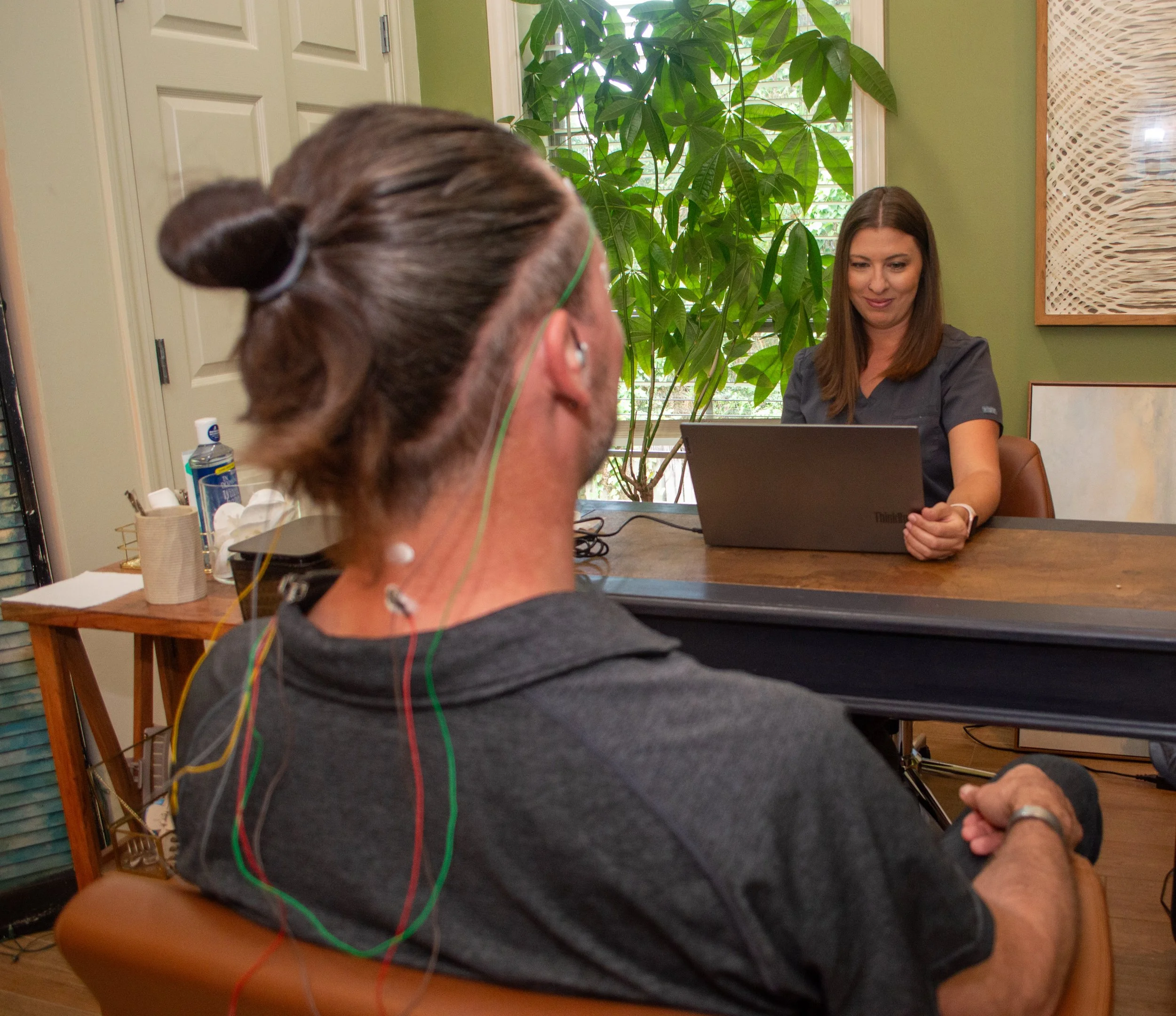MCN for Sleep Issues & Insomnia: How Microcurrent Neurofeedback Helps Your Brain Rest
If you’ve ever found yourself staring at the ceiling long after you should be asleep — replaying your day, stressing about tomorrow, or feeling like your brain just won’t shut off — you’re not alone.
Nearly 1 in 3 adults in the U.S. experiences insomnia symptoms, and for many, traditional solutions like medication or sleep hygiene tips only go so far.
But what if your brain could relearn how to rest naturally?
That’s where Microcurrent Neurotherapy (MCN) comes in.
MCN isn’t a sleep pill or a quick fix. It’s a gentle, non-invasive therapy that helps your brain reset its natural rhythm, restoring balance to the systems that control sleep, stress, and focus.
Read: What is Microcurrent Neurofeedback?
What Causes Sleep Problems?
To understand how MCN helps, it’s important to know why so many people can’t sleep well.
Sleep problems are often tied to dysregulated brainwave activity meaning your brain is “stuck” in patterns of alertness, stress, or overthinking even when your body is tired.
Common causes include:
Chronic stress and anxiety
PTSD or trauma disrupting the nervous system
ADHD or overactive brain patterns
Depression or hormonal changes
Irregular sleep-wake cycles or screen exposure at night
When your brain can’t shift into slower, more restorative rhythms (like alpha and theta waves), it struggles to enter deep, restful sleep.
You might fall asleep but wake up constantly, or never fully feel rested even after 8 hours in bed.
What Is Microcurrent Neurotherapy?
Microcurrent Neurotherapy (MCN) — sometimes called Microcurrent Neurofeedback — uses tiny, painless electrical signals to help the brain “reset” its communication patterns.
A Relaxing Session of Microcurrent Neurofeedback in Spanish Fort Alabama.
During a session:
Sensors are placed on the scalp and neck.
The device reads your brainwave activity in real time.
Gentle microcurrents (about a billionth of an amp) are sent back to the brain, encouraging it to self-correct and return to balance.
There’s no shock, no drugs, and no lasting side effects.
Most people describe the experience as deeply relaxing, often noticing improved sleep or reduced mental chatter within the first few sessions.
How MCN Improves Sleep
When the brain is under chronic stress, its electrical activity can become chaotic (constantly firing in “fight or flight” mode).
MCN helps by calming this overactivity and guiding the brain back toward homeostasis.
Here’s how that affects sleep:
Reduces Hyperarousal
Many people with insomnia have brains that simply won’t slow down. MCN helps quiet overactive beta waves, allowing the brain to enter calmer alpha and theta states that support deep sleep.Balances the Nervous System
Chronic stress or anxiety activates the sympathetic nervous system (“fight or flight”). MCN encourages parasympathetic activity (“rest and digest”), which is essential for falling and staying asleep.Improves Circadian Regulation
By helping normalize brainwave patterns, MCN can support more consistent sleep-wake cycles. Over time, clients often report naturally feeling sleepy at night and alert in the morning.Supports Trauma Recovery
For those with PTSD-related insomnia, MCN can reduce hypervigilance and nighttime anxiety key factors that keep trauma survivors awake.
What the Research Says
Clinical research and case studies support the use of neurofeedback-based interventions for improving sleep quality:
Recent reviews, including one published in Frontiers in Human Neuroscience (2022), describe neurofeedback as a promising and safe approach for improving sleep. While results vary between studies, many participants report better sleep onset and overall restfulness.
Patients often report improved sleep within 1–3 sessions of MCN, though lasting change typically builds over 8–15 sessions as the brain stabilizes.
While more research is ongoing, results across clinics consistently show positive outcomes for people with sleep disorders, anxiety, depression, and trauma-related insomnia.
What to Expect During MCN Sessions
Your first MCN appointment is simple, gentle, and often deeply relaxing.
Here’s what happens:
You’ll sit comfortably while small sensors are placed on your scalp and neck.
The system reads your brainwave patterns and delivers microcurrents (you won’t feel them).
Sessions typically last 20–30 minutes.
Afterward, many people report feeling calm, centered, and mentally clear.
Some clients notice improved sleep after just one session, while others experience gradual change over several weeks as the brain learns to regulate itself more efficiently.
Who Can Benefit from MCN for Sleep?
MCN may help if you experience:
Difficulty falling or staying asleep
Racing thoughts or anxiety at night
Nightmares or restlessness from PTSD
Poor focus or fatigue during the day
Reliance on sleep aids with unwanted side effects
Because MCN is completely non-invasive and drug-free, it’s safe for most people, even those currently taking medication. It can also complement talk therapy, EMDR, or traditional sleep hygiene practices.
Restoring Rest Naturally
Healthy sleep isn’t just about hours in bed, it’s about brain balance. When your nervous system can finally relax, your body follows.
Microcurrent Neurotherapy gives your brain the chance to do what it was designed to do: reset, repair, and rest.
If you’ve tried everything for your sleep — and nothing seems to work — MCN may be the gentle, science-backed solution that helps your nights (and days) finally feel calm again.
Ready to experience better sleep?
Book your first Microcurrent Neurotherapy session for free today and start giving your brain the rest it deserves.




